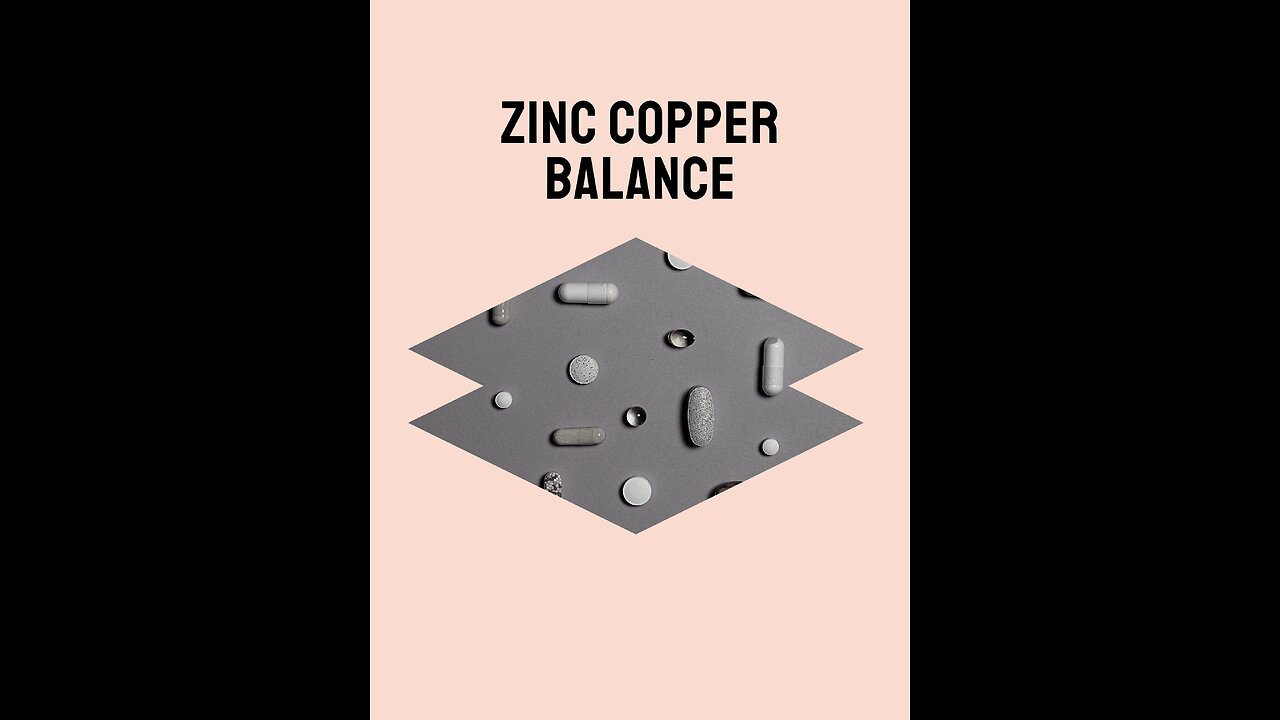Premium Only Content

maintain the right zinc copper balance
Maintaining the right zinc-copper balance is essential for overall health, as both minerals work together in harmony within the body. Zinc plays a critical role in immune function, wound healing, hormone regulation, and DNA synthesis, while copper supports energy production, brain health, iron metabolism, and connective tissue strength. An imbalance—whether too much zinc or too much copper—can lead to serious health concerns such as fatigue, weakened immunity, neurological issues, anemia, and tissue calcification.
Excess zinc supplementation may deplete copper, increasing the risk of copper deficiency and associated problems like anemia and cardiovascular stress. On the other hand, high copper levels without adequate zinc can cause oxidative stress, mood disturbances, and even worsen conditions like copper toxicity. Achieving balance often requires proper dietary intake through foods rich in zinc (pumpkin seeds, beef, shellfish) and copper (nuts, seeds, dark chocolate, organ meats), as well as careful supplementation under professional guidance.
Understanding the zinc-to-copper ratio is key for maintaining optimal metabolic, neurological, and immune system function. Supporting this mineral balance may reduce inflammation, improve mental clarity, support hormonal equilibrium, and protect long-term cardiovascular health.
---
Target SEO Keywords
Zinc-copper balance
Zinc to copper ratio
Zinc and copper interaction
Zinc and copper supplements
Copper deficiency and zinc
Zinc excess copper depletion
Optimal zinc copper ratio
Zinc copper imbalance symptoms
Copper toxicity and zinc
Balancing trace minerals
---
Internal SEO Links (link to your own related content)
Copper Toxicity – explore how excess copper impacts health.
Zinc Benefits – learn why zinc is vital for immunity and hormones.
Nutrient Deficiencies – understand how imbalances affect the body.
Multivitamins – choosing the right supplement to avoid imbalance.
Tissue Calcification – how mineral imbalances contribute to calcification.
---
External SEO Links (authoritative references)
NIH Zinc Fact Sheet
NIH Copper Fact Sheet
Linus Pauling Institute: Zinc and Copper
PubMed on Zinc-Copper Interactions
-
 16:09
16:09
Nikko Ortiz
2 days agoMilitary Fails That Got Soldiers In Trouble
57.1K13 -
 2:21:49
2:21:49
PandaSub2000
11 hours agoSuper Seducer 3 - Part VII (w/DJC Game Studios) | PANDASUB PLAYS (Edited Replay)
14.1K1 -
 24:36
24:36
GritsGG
14 hours agoINSANE Warzone Solo PR! 40 Bomb Dropped!
8.72K2 -
 1:54:13
1:54:13
The Michelle Moore Show
1 day ago'Three Protocols For Miraculous Healing' Guest, Dr. Margaret Aranda: The Michelle Moore Show (Nov 18, 2025)
38.6K12 -
 56:25
56:25
ThisIsDeLaCruz
1 day ago $1.03 earnedHow Benson Boone’s Engineer Mixes From a Room You Never See
8.66K1 -
 6:10
6:10
Blabbering Collector
13 hours agoSaudi Arabia To Buy Warner Bros, Daniel Radcliffe Comments On HBO Harry Potter
11.8K4 -
 LIVE
LIVE
Lofi Girl
3 years agolofi hip hop radio 📚 - beats to relax/study to
271 watching -
 36:57
36:57
The Pascal Show
1 day ago $2.56 earned'THERE'S NOTHING TO HIDE?!' Trump SUDDENLY Urges House Republicans To Vote Release Epstein Files
10.6K1 -
 2:50:17
2:50:17
FreshandFit
14 hours agoClavicular Rates The Entire Panel’s Looks & They Get TRIGGERED
312K122 -
 2:22:44
2:22:44
Badlands Media
15 hours agoDevolution Power Hour Ep. 408: Immigration Panic, Epstein Optics & the Narrative Unraveling
106K24